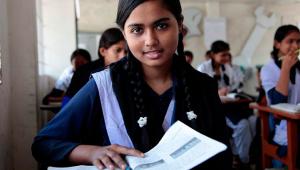The funds will help ensure equal access to education and learning opportunities around the world and could help more than eight million children and teenagers.
The pledge represents “the single largest investment in education for women and girls in crisis and conflict situations”, said the Canadian prime minister Justin Trudeau, who hosted the G7 Summit in Quebec at the weekend.
The funds will be spent over three to five years to train teachers and improve curriculums, track educational data, support new teaching methods, and boost women and girls’ graduation rates in developing countries.
Canada will provide $310m of the total over three years, the UK said it would invest $250m, and the World Bank said it would contribute $2bn over five years.
Stuart Hickox, the Canada director of The ONE Campaign, an international organisation to fight extreme poverty, said: “The announcement at the G7 of CND$3.8bn for girls’ education is exciting and we are eager to learn more about it.
“With 130 million girls out of school around the world right now, any dollar that helps a girl get an education is a good one.”
During the summit, the G7 countries also pledged to tackle ocean pollution by cutting down on plastic, although neither the US nor Japan agreed to a detailed timeline.
The German chancellor Angela Merkel and France’s president Emmanuel Macron said the goal was to achieve 100% recycling of plastics by 2030.
The commitments of the four European countries – Italy, France, Britain and Germany – are in line with the European Union’s plans to ban single-use plastic products and recycle 90% of plastic bottles by 2025.
The annual G7 summit brings together Canada, the US, the UK, France, Italy, Japan and Germany, which together represent more than 60% of global net worth.






